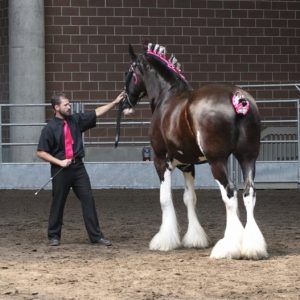ASHA Standard of Conformation Guidelines
(adopted May 18, 1977)

Stallions:
- Color: Black, brown, bay, gray, or chestnut/sorrel (rare) are the preferred colors. Excessive white markings and roaning are undesirable.
- Height: Minimum 16.2 hands and upwards. Average 17.1 hands.
- Head: Long and lean, neither too large nor too small, with long neck in proportion to the body. Large jaw bone should be avoided.
- Eyes: Large, well set and alert. Wall-eyes should be avoided if possible.
- Nose: Nostrils thin and wide, lips together and nose slightly Roman.
- Ears: Long, lean, sharp, and sensitive.
- Throat: Clean cut and lean.
- Shoulder: Deep, oblique, wide enough to support the collar.
- Neck: Long, slightly arched, well set on to give the horse a commanding appearance.
- Girth: Deep, with adequate width in proportion to the rest of the body.
- Back: Short, strong, and muscular. Should not be dipped or roached.
- Loins: Standing well up, denoting constitution.
- Fore-end: Wide across the chest, with legs well under the body and well developed in muscle, or action is impeded.
- Hindquarters: Long and sweeping, wide and full of muscle; well let down toward the thighs.
- Ribs: Round, deep and well sprung, not flat.
- Forelegs: Should be straight as possible down to the pastern.
- Pastern: Fairly long and sloped at about 45-degree angle.
- Hind legs: Hocks should be clean, broad, deep, flat and wide when viewed broad-side; set at the correct angle for leverage, and in line with the hind quarters. Should be of heavy bone; “puffy” and “sickle” hocks to be avoided. The legs should be clean cut, hard, and clear of short cannon bone.
- Feet: Moderately deep and wide at the heels; coronets open.
- Feather: Fine, straight, and silky.
- He should possess a masculine head, and a good crest with sloping, not upright, shoulders running well into the back, which should be short and well coupled with the loins. The tail should be set well up, and not what is known as “goose-rumped.” Both head and tail should be carried erect. The ribs should be well sprung, not flat sided, with good middle, which generally denotes good constitution. The most essential parts of a stallion are his feet and joints; the feet should have open necks, big around the top of the coronets, with plenty of length in the pasterns. When in motion, he should go with force, using both knees and hocks, which the latter should be kept close together. He should go straight and true before and behind.
Geldings:
- Geldings should conform to stallion standards, with the exception of the thick, masculine neck.
Mares:
- Mares should conform to the stallion standards, except that they may be slightly smaller with a feminine and matronly appearance. A mare should have plenty of room to carry a foal.
